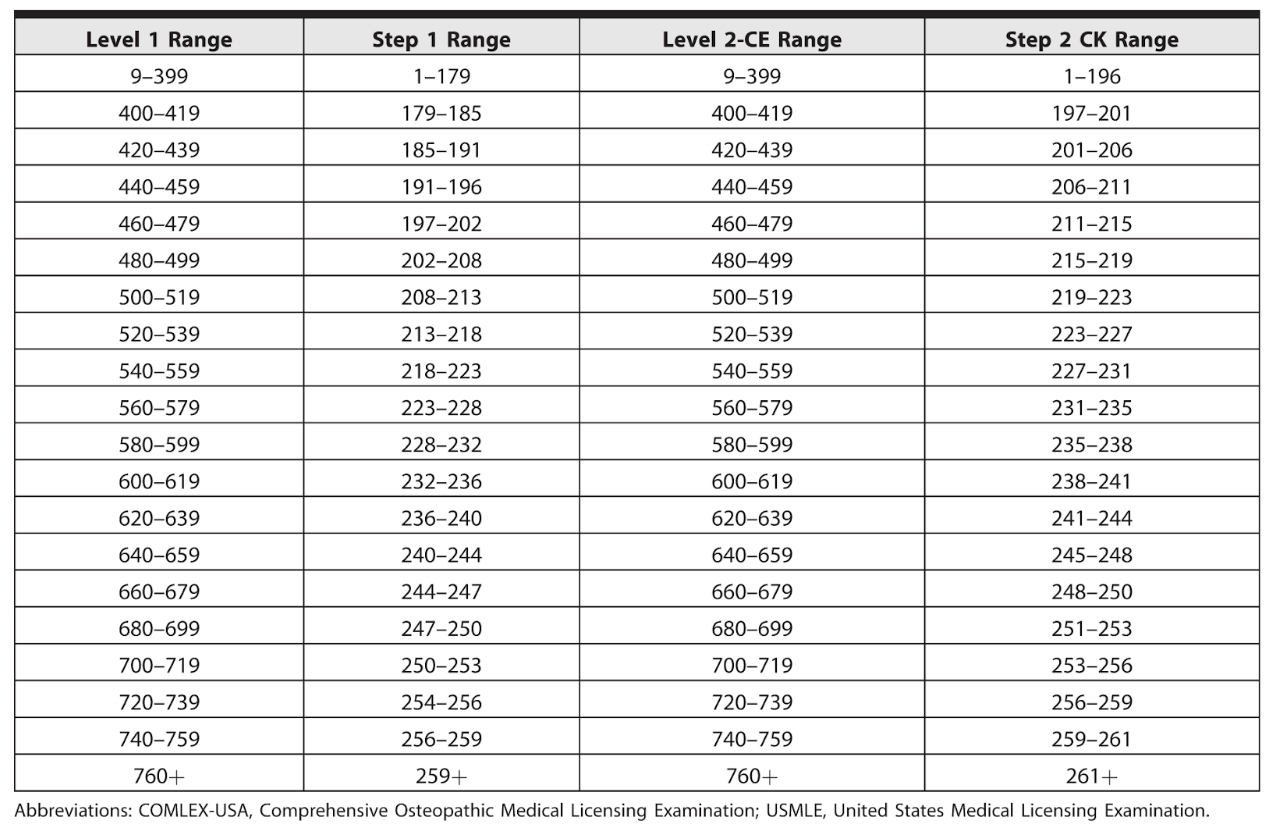The USMLE Step 1 exam is now pass/fail. Preclinical and clinical faculty alike agree that this transition will “hopefully” lead to a shift in the motivation of medical students. The information tested on Step 1/Level 1 exams is considered to be the foundation for the information tested on Step 2/Level 2 exams.
Why did USMLE Step 1 go pass / fail?
According to multiple years of NRMP survey data, the USMLE Step 1 exam has been considered the number one factor contributing to residency program interview offers. Historically, the more competitive the specialty, the higher the board score needed to be. This has led to resource overload and increased out-of-pocket expenses for medical students scrambling to perform well on, what has been referred to as, “the most important test of medical school.”
Many professors, physicians, spouses, medical students, and even the American Medical Association have admitted that the previous system caused significant (undue) distress on medical students across the board. It was felt that, by transitioning to pass/fail, this would help to relieve some of the psychological, emotional, physical, and financial stress put upon students trying to achieve higher and higher scores.
Not only were higher scores needed to get an interview, they were often required to remain within the search queue of residency directors. It has been openly stated that, in the time of ever increasing numbers of medical students, program directors have “filtered out” applications based not only on location, but on a cut-off board score. Without achieving this score, hundreds and even thousands of potentially great applicants have undoubtedly been overlooked over the years.
Not only did the previous scoring system cause significant distress for students, it also created a trend of skipping medical school-provided lectures in search of “high-yield” material. It has been expressed by many practicing physicians that this has led to a buzz-word heavy medical student pool without the tools necessary to enter residency.
In comes the pass/fail transition.
What are the benefits to you?
The USMLE Step 1 exam is now pass/fail. This encourages students to attend lectures, save money on overloading resources, focus on their preclinical curriculum, and create a more solid foundation for the USMLE Step 2 and 3 exams, as well as their future careers.
Preclinical and clinical faculty alike agree that this transition will “hopefully” lead to a shift in the motivation of medical students. Instead of learning concepts with rote memorization only to be dumped after the exam, medical students can focus on truly learning and understanding the basis, conditions, and treatments of their future patients.
This also will hopefully lead to a large reduction in the stress and anxiety over performance standards and benchmarks for second-year medical students. With the growing wave of mental health-focused objectives and resources, this will definitely have a major impact.
What are the disadvantages to you?
It is obvious that this transition will NOT fix the problem, but it is a start. The issues that remain are as follows:
1. There is a worry that the USMLE Step 2 exam will become the new “cutoff” score contributing to residency interview offers. This leads to a whole host of new problems including:
- Increased stress and time studying during the clinical years of medical school during which students are supposed to be learning “real” practical medicine and experiencing differences within distinct specialties
- The lack of a standardized score prior to applications for audition/sub-internships could lead to difficulty getting selected for the opportunities if there is no previously established connection with the site
2. The transition to pass/fail will not alleviate the “filtering out” of applicants as the increased number of applications per cycle remains. Other characteristics will be used for these filters instead.
- The major concern is that programs will use the perceived “status” or “reputation” of a medical school to gauge a prospective residency applicant’s education and training rather than their own performance
3. As the Step 2 exam is the only scored exam, students no longer have two opportunities to hit a high score. They also now lack the opportunity for significant improvement between the two exams.
- With students usually taking the exam in the summer months before the start of their 4th year and away rotations, this leaves little to no time should a student need to retake the exam prior to applying for residency.
4. The information tested on Step 1/Level 1 exams is considered to be the foundation for the information tested on Step 2/Level 2 exams.
- Should students choose not to acquire the foundational information for the first set of exams due to the need to “only pass,” they may struggle on the second set to achieve their goal scores needed to meet the new set of cutoffs / ranges.
What about DO students taking COMLEX Level 1 (pass/fail as of May 1, 2022)?
The advantages and disadvantages will likely be the same for osteopathic medical students. The hope is that this transition will alleviate the perceived “need” held by so many that osteopathic students should take the Step 1 exam on top of their required Level 1 exam.
However, recently published research has shown how COMLEX Level-1 scores can relate to USMLE Step 1 scores and that a passing score on Level 1 does not necessarily correlate with a passing score on Step 1 (400-459 correlating with <196).

This report and others like it could lead to assumption and bias that students with only a passing Level 1 score are not on the same level as those with a passing Step 1 score.
Because of this recently brought up argument, it is likely that osteopathic students striving towards more competitive specialties will still need to take the Step 1 exam. If nothing else, this will help prevent this cohort of students from being “filtered out” of the residency interview application process.
How does this change affect how Bootcamp.com will create / tailor content?
Honestly, it shouldn’t change much about how students prepare to take their board exams. Medicine is a subject with such depth that no one can be expected to “know it all.” Therefore, board exams historically focus on certain aspects of medicine that lead to a more tailored study experience.
While we at Bootcamp want to see our students achieve high scores, there is more to what we are doing here. The TRUE goal at Bootcamp is to help students become the best practitioners for their future patients, which cannot simply be based on a test score.
Through our thorough content videos, vignettes, and in-depth answer explanations, Bootcamp ensures our students are understanding the material in a way that is applicable to real-life scenarios. We are presenting our material in a way that gives students the confidence and knowledge to develop the clinical acumen necessary to do well in all settings, instead of relying on “buzzwords.” This is just how real-world patients will present.
These are all goals we should be striving for regardless of a test being pass/fail or scored. That being said, we will be prioritizing the most highly tested concepts first during development to ensure that our content is most highly reflective of the current medical boards.
Get everything you need in one place. Start studying today for free.



.jpg)













